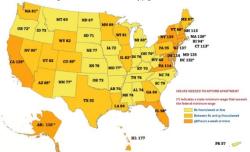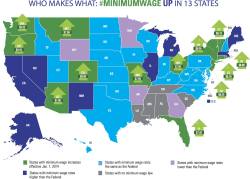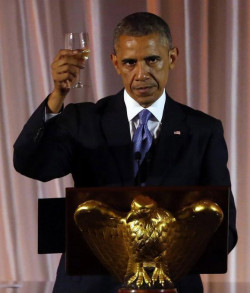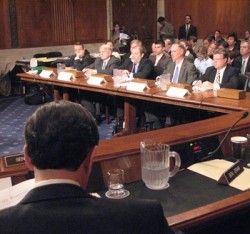Category Archives: Statehouse
Adam Ozimek has an idea for Republicans:
Here’s what they should do: offer a compromise to Democrats that passes a $15 federal minimum wage in exchange for cutting corporate tax rates.
Why would this deal represent a win for Republicans rather than just a compromise? Because regardless of the support it generates among fast food protestors and advocates, a $15 minimum wage would simply be untenable. The increase in unemployment would be swift and significant, and Democrats would be unable to deny it. The $15 minimum wage would be repealed very quickly in a bipartisan consensus.
Well, that’s certainly putting his money (or policy) where his mouth is, in terms of his opposition to raising the minimum wage.
The problem I see with the bargain is this: The effects of raising the minimum wage would be pretty unequally distributed. As would nixing the corporate income tax, though the effects there are harder to lay out.
 High-wage, high-cost places would likely not feel the increased minimum wage nearly as much. Nowhere would it be less felt, for example, in Western Dakota. After that, you’d be looking at New York City, San Francisco, Seattle, DC and other Democratic strongholds where you can afford to raise the minimum wage somewhat because (a) basement wages are higher to begin with, (b) there is more money flying around, and (c) it’s more justifiable there because of the cost of living.
High-wage, high-cost places would likely not feel the increased minimum wage nearly as much. Nowhere would it be less felt, for example, in Western Dakota. After that, you’d be looking at New York City, San Francisco, Seattle, DC and other Democratic strongholds where you can afford to raise the minimum wage somewhat because (a) basement wages are higher to begin with, (b) there is more money flying around, and (c) it’s more justifiable there because of the cost of living.
This is why I don’t have any objections – or predict much in the way of negative consequences – when high-cost cities choose to increase their minimum wage. To the extent that we’re going to have a minimum wage, it makes sense that the minimum wage have some sort of relationship to purchasing power.
But that’s also why I am critical of the likely consequences of a state-wide or nation-wide bump. If you raise the minimum wage in Washington, you’re raising it in Seattle and you’re putting Eastern Washington at a distinct disadvantage. There’s less money out there to pay people $10-15/hr, and cities like Pullman would be at a disadvantage compared to cities like Moscow, right across the Idaho border.
 You can get rid of the state line problem by raising it nationally, of course, but the disparities become more stark. Having the same minimum wage in Mississippi as in San Francisco makes little sense. The positive effects are more likely to hit the latter, the negative effects more likely to hit the former.
You can get rid of the state line problem by raising it nationally, of course, but the disparities become more stark. Having the same minimum wage in Mississippi as in San Francisco makes little sense. The positive effects are more likely to hit the latter, the negative effects more likely to hit the former.
That’s a policy problem, but it’s also a political one. If the positive effects are felt primarily by the constituents of one party, and the negative effects felt primarily by the other, it’s hard to get that bipartisan consensus to repeal it. At the least, there would likely be enough support for it to hold the minimum wage where it is while inflation catches up to it. Which leaves some states better off and some states worse off (and I think this is an optimistic assessment, when we’re talking about $15/hr), if you represent the latter, you’re not doing your job if you sign on to this bargain. Especially when (by my seat-of-the-pants assessment) the benefits of the corporate tax elimination would primarily go to wealthy and blue states (and Texas).
 Former Congressman James Traficant (D-OH) has apparently died. Traficant was, during his tenure, one of the most colorful members of the House known for his audacious toupee, odd dress, and ending his speeches with “Beam me up…”
Former Congressman James Traficant (D-OH) has apparently died. Traficant was, during his tenure, one of the most colorful members of the House known for his audacious toupee, odd dress, and ending his speeches with “Beam me up…”
Throughout most of his tenure, he was a thorn in the side of his party. Particularly as he became more conservative and his district became more liberal. A staunch critic of immigration and Israel, he is a hero in some anti-immigration and anti-Semitic circles.
When he faced congressional expulsion, the only “nay” vote was Gary Condit. Another prominent supporter was David Duke.
Here is a snippit from one of the more colorful speeches he gave before congress:
Here is a speech he gave during his expulsion trial:
He is the only person ever to win a RICO case without counsel, though a couple decades later it was another RICO case that took him down. After seven years in congress, he served seven in prison.
-{This post involves race and politics, so obviously partisan and racial commentary is okay. Do comment with care, however.}-
The Hollywood Reporter has a lot of interesting background stuff on Saturday Night Live in recent years. The most interesting part to me, naturally, is the show’s political balance. James Downey, a writer on the show, commented with regard to their treatment of Barack Obama:
If I had to describe Obama as a comedy project, I would say, “Degree of difficulty, 10 point 10.” It’s like being a rock climber looking up at a thousand-foot-high face of solid obsidian, polished and oiled. There’s not a single thing to grab onto — certainly not a flaw or hook that you can caricature. [Al] Gore had these “handles,” so did Bush, and Sarah Palin, and even Hillary had them. But with Obama, it was the phenomenon — less about him and more about the effect he had on other people and the way he changed their behavior. So that’s the way I wrote him.
 This strikes me as pretty wrong, on its face. I knew even way back then the tact I would take: aloof, arrogant, and self-interested. Now, I don’t know the extent to which he actually is these things, but he did actually come off that way just a bit from early on. Enough to be able to pounce on. But SNL didn’t and said, even back then, that Obama was just so hard to make fun of.
This strikes me as pretty wrong, on its face. I knew even way back then the tact I would take: aloof, arrogant, and self-interested. Now, I don’t know the extent to which he actually is these things, but he did actually come off that way just a bit from early on. Enough to be able to pounce on. But SNL didn’t and said, even back then, that Obama was just so hard to make fun of.
It’s tempting to chalk this up to politics, but Downey isn’t very liberal, had some serious issues with Obama, and did go after him in another way (specifically, the media’s treatment of him). It’s honestly hard not to attribute this mostly to race. Specifically, the fear of being racist.
It isn’t the worst thing in the world, of course, that it’s harder to make fun of black candidates and presidents without getting a social wrist-slap. I’d argue that it’s actually generally a good thing. I do think that there was the fear of either being considered racist – even if white candidates do get that treatment. I think there was the fear of giving the racists’ cover (and I have no trepidation in saying that a lot of Obama’s critics are racist or use racism as a spiked hammer in their attacks). Which is actually quite understandable, but very much to the detriment of the show itself.
This actually speaks a bit to the odd place that Obama puts us in. Both in the sense that his critics have used his race to attack him, and in the sense that his supporters have attempted to link race with the vast majority of attacks against him. Unless it’s Obama eating a watermelon or something to do with Kenya, there are very few Obama criticisms that are so clearly and incontrovertibly about race that you can attribute it to such. Think back to the criticisms of previous presidents and how they might be perceived if applied to Obama:
He’s is a womanizer… that’s a fear of black male sexuality.
He’s is a smooth talker… ditto.
He’s is stupid… are you saying black people are stupid?
He talks funny… uhhhh?
He is a wimp… said only due to racist stereotypes of black masculinity.
So we’re left to where a race angle can be provided to just about anything. But it’s too easy to say that we shouldn’t consider race unless it’s a cross burning on a front lawn. One of the things Game Change that was pretty clear was that Hillary Clinton’s and John McCain’s people (over the alleged objections of the candidate) were using race, even when there was plausible deniability. And Obama’s people were using charges of racism even when they didn’t think that racism was actually a factor.
I said when Obama first clinched the Democratic nomination that it would be a race between the two parties. The Republicans would try to make race an issue as much as they could without getting called on it. The Democrats would try to take as many criticisms off the table by calling it racist. I should have figured this would apply to candidates as well.
 In recent weeks, Mitt Romney has been experiencing an interesting insurgence. Emil Henry made The Case for Mitt Romney in 2016, followed by former Romney foreign policy advisor Alex Wong arguing that Romney was right.
In recent weeks, Mitt Romney has been experiencing an interesting insurgence. Emil Henry made The Case for Mitt Romney in 2016, followed by former Romney foreign policy advisor Alex Wong arguing that Romney was right.
More recently, Matt K Lewis argues that Romney in 2016 doesn’t sound as ridiculous as it might, Congressman Jason Chaffetz argues that Mitt Romney will run in 2016 and will win.
It’s not just the media or politicians talking to the media. Romney is in demand for Republican congressional candidates at rallies, and perhaps more notably, Romney beats Obama handily in an “if the election were held today…” question.
Buyer’s remorse is one thing, but I simply cannot remember John Kerry ever getting this kind of love in 2006. The two actually have quite a bit in common. They lost the popular vote handily but not overwhelmingly. Neither was beloved by the party that nominated them. Both lost against incumbents who had either a limited or no second honeymoon. Both had personalities that did not go over well with the electorate. And yet while Kerry may have won such a hypothetical poll in 2006 and probably did, I don’t remember any of this for him and in fact he was talking about running again in 2008 and was pretty much shot down on the idea.
So what’s going on?
I think some of it is a recognition among non-partisans that Romney may have gotten a raw deal. Remember when he ridiculously asserted that Russia was a geopolitical rival? Haha, old-timer! And binders of women? Haha, there was something wrong with that because it sounds funny. He never actually said he likes firing people, we can all pretend that he did.
I can actually sympathize with some of this, insofar as my own view of him is considerably less negative now than it was on election day. The thing about Romney, though, is that he was always better at a distance. The girl in the clown suit.
More to the point, the reasons he lost to a president of at most midling popularity in 2012 haven’t gone away. It can’t even be said that the party that was dragging him down (and it was the party dragging him down rather than vice-versa) has changed, or that he would have more capacity to change it in or by 2016 than he did in 2012.
And, of course, he won’t be running against an unpopular Barack Obama. He’d likely be running against Hillary Clinton, who crushes him just as handily as he did Obama on the very next question of the same poll.
Now, I happen to think that Clinton herself is not as invulnerable now as the polls suggest. I suspect that she will more likely than not be our next president, but like Mitt, Hillary looks better at a distance and she lost a nomination that should have been hers for a reason. If there is a Republican to take her down, I simply can’t imagine it’s the guy with a similar baggage portfolio. About the best that can be said of Romney is that he would be better positioned to defeat HRC than Jeb Bush.
Which brings us to the real reason behind the seeming Romney renaissance. The GOP has nobody else. By the time Kerry came along, many of the Democrats were already looking at Hillary Clinton or dreaming about Al Gore or Barack Obama. Not only did they have a list of winnable candidates, but the Republicans lack their own HRC2016. With Chris Christie torn asunder, Paul Ryan not looking to run, and the other candidates being completely and entirely unacceptable to major fragments of the party, one of the two the tallest men on the field is the guy who was too short to win a winnable election (and the other the brother of the guy who got the party in the position that it’s in).
All of which to say is that the principle lesson to all of this is that the GOP has some serious work to do.
The US Senate is deliberately non-democratic. This is known. How it got this way goes beyond the Connecticut Compromise, however, and the advantage to the GOP doesn’t necessarily come from where you think it might.
 It is well-known that the United States Senate disproportionately favors less populated states. Wyoming, our nation’s least populated state, has two senators for its population of roughly 580,000 people. California, meanwhile, also has two senators for its population of over thirty-eight million people. Meaning that the average citizen of Wyoming has Senate representation greater than sixty-six times that of the average Californian.
It is well-known that the United States Senate disproportionately favors less populated states. Wyoming, our nation’s least populated state, has two senators for its population of roughly 580,000 people. California, meanwhile, also has two senators for its population of over thirty-eight million people. Meaning that the average citizen of Wyoming has Senate representation greater than sixty-six times that of the average Californian.
Disparities in upper houses aren’t unique to the United States. In Germany, each of the states have between four and six members of their upper house (the Bundesrat). Though it’s is apportioned by population, but that doesn’t come close to accounting for a population disparity where the least populace state has 600,000 and the most populous over seventeen million. Like the United States, Australia’s upper house gives uniform senate representation despite significant population disparities. Canada’s upper house representation is hard-coded into their constitution in such a way that New Brunswick (population 750,000) has ten senators while British Columbia (population 4,400,000) has only six.
The circumstances in all of these upper houses are different, of course. They also have different powers and responsibilities, with some having more than others and few having as many as the United States. In the Bundesrat, the members are appointed by the state executives, while in Canada they are appointed by the Prime Minister.
What makes the United States unique is the combination of how selection occurs, the scope of the population disparity, and the amount of power enjoyed by the senate. Not just by virtue of the fact that (unlike Australia, Canada, Germany, and others) we don’t have a chief executive derived from the other house, but because of custom, legislative rules, and powers specifically given to it in the Constitution. All of which make the sheer size of the population disparity more contentious.
As most of you know, Seattle has raised its minimum wage to $15/hr. It follows the airport town of SeaTac doing the same, and has made more tangible the federal government’s to raise it to roughly ten dollars an hour by making it seem more modest.
The minimum wage has become a battlefront on the subject of inequality. Even some who support raising the minimum wage to $10 are more skeptical of the higher figure. Even inequality guru Thomas Piketty is concerned.
One of the advantages of having our decentralized systems is that I can eagerly await the results – whatever they are – without having to face any negative consequences if it does turn out to be a bad idea. I feel the same way about Vermont’s flirtations with single-payer.
The other advantage to having a decentralized system is that it can take advantage of what being a good idea in one place can be done there, but other places don’t have to follow suit. If we’re going to try an extremely high minimum wage somewhere in the country, Seattle is actually a pretty good candidate. The high cost of living makes a $15 minimum wage easier to justify than in a city like Boise or Denver. It also has a booming economy, lots of money, and a lot unemployment rate.
Further, Seattle is actually not all that large. It’s city population is above Nashville but below El Paso and Forth Worth. What we think of as “Seattle” is actually a clump of cities. But the minimum wage hike will only apply to Seattle. This could be good if it allows some of the low-wage amenities to exist just beyond city limits but still be accessible to the city’s population. It could be a bad thing if it drives out some jobs. Since Seattle is expensive, though, and more expensive than most of the area that surrounds it, it could make it harder to discern overall effects.
If things go well in Seattle, or are assumed to, we should be wary about talking about rolling it out nation-wide or using it as a justification to angle a national minimum wage towards $12 or something. But if successful in Seattle, then it’s definitely something that similar cities like San Francisco and New York should (and undoubtedly would) look at. These places are far more expensive to live in, and given those employers that are still there are so despite increased costs, it could be that there is quite a bit of inelasticity involved.
Dave Schuler’s concerns, though, are probably pretty well-founded:
I can believe that a $15 minimum wage in Seattle where the unemployment rate is 5.3% can be absorbed by the local economy. Seattle’s local minimum wages incentivizes politicians in Chicago where the unemployment rate is 10.6% to push for our own $15 minimum wage and here it might well throw people out of work or make it harder for them to find work. Not to mention driving businesses on which the poor depend out of the city or even out of the state.
Chicago politicians can always deny responsibility on a “hoocoodanode” basis.
Simon and CGHill wonder why the Obama Administration wants to raise the minimum wage to $10.10, precisely:
If $10.10 is good wouldn’t $5,000.00 be 495 times better? And why stop at $5,000.00? Why not a $1,000,000.00 an hour minimum? Think of the economic improvement to our poorest workers that would give. A minimum wage of $1,000,000,000,000.00 an hour would allow the government to run a surplus with ridiculously low taxes.
Well, the reason why not $5,000 an hour is that most supporters of raising the minimum wage do recognize that there can be adverse effects. Economists all agree on that, though many economists believe that raising the minimum wage by a more modest amount either won’t have much of an effect or will have a marginal one. There are studies to support both arguments for smaller hikes, but a consensus on larger ones. Most of them probably think we could go above $10.10 an hour, but few are under delusion that you can go however high you want.
The interesting part to me is the extra ten cents an hour. Why? I suspect the answer is “thinking ahead.” A lot of supporters of a higher minimum wage will want to raise it again before too long and some states will want to raise it immediately. $10.00 is such an even number that there might be more psychological comfort with that number. It’s not unlike how some states are finding 10% to be the cap for sales taxes. There’s no particular reason why raising it from 9.5% to 10% should be different from 10% to 10.5%, but there is.
$10.10 isn’t as comfortable a stopping point as $10, and that’s a feature.
The FDA has announced its initial regulatory intent with ecigarettes:
Health warnings would also be required and the sale of the products in vending machines would be prohibited. Initially, the only health warning required for e-cigarettes would be about the potential for addiction to nicotine.
Manufacturers would be required to register all their products and ingredients with the FDA. They would only be able to market new products after an FDA review, and they would need to provide scientific evidence before making any claims of direct or implied risk reduction associated with their product.
Companies would also no longer be allowed to give out free samples.
After the public comment period and once the proposed rules are finalized, manufacturers will have 24 months to submit an application to allow their products to remain on the market or submit a new product application.
E-cigarettes deliver nicotine to the user as a vapor. They are usually battery-operated and come with a replaceable cartridge that contains liquid nicotine. When heated, the liquid in the cartridge turns into a vapor that’s inhaled.
As someone who was expecting our own regulatory proposals to mirror Europe’s, I am honestly quite relieved. Counterproductive in some areas, but in others I don’t think they went far enough. Yet, that is. Which is the caveat. The indications are that there will be more to come. (more…)
-{So yeah, this is a post about immigration. Feel free to voice opinions on the immigration topic. It’s a relatively wide – but not unlimited – berth here.}-
Bryan Caplan reluctantly points out a possible solution to unauthorized immigrant labor enforcement:
Still, there is a way to make Unz’s proposal even more diabolical. I hesitate to reveal it, but I seriously doubt the nativists will listen. The heart of darkness: Give a green card to any illegal immigrant who testifies against his employer for labor law violations. You solve for the tragic equilibrium.
This may sound familiar, as it’s something I have proposed before. To clarify, my “proposal” being less of something we should do, but something that we can do if we ever want to get serious about it. The response I have historically gotten is that it’s something conservatives would never sign on with because they want it to be all about the immigrants and not the employers. Which I actually find to be a misunderstanding of the border hawks by the border doves. Border hawks strongly dislike employers who illegally hire people who aren’t here legally.
The “green card” aspect may be a tougher sell. But not nearly as tough a sell as it is to the people who say that there is just nothing we can do to stem the tide.
Ultimately, the big problem with illegal immigration (or at least the workforce component) is that it’s a win-win situation for those most involved in the situation. Employers get cheap labor. Immigrants get jobs. Those that are (at least theoretically) being hurt are not in sufficient proximity to the situation to do anything about it.
The key, then, is to turn employer and employee against one another. Sew mistrust. Make the employers scared of the employees, who will have the ability to get above the table simply by diming out the employer. You might not even have to, but if you threaten to deport everyone else who works for the company, you turn the employees against one another, too. It would make it much, much more difficult to keep these arrangements going.
There are some downsides. It would, likely, result in some anti-Hispanic and anti-Asian discrimination (including against those here legally). Just as any effort to come down on employers would. Verification schemes tend to penalize everybody equally. With this, employers would simply be more wary of demographic profiles that are perceived to be disproportionately likely to be here illegally. On the other hand, if an employer has a degree of indemnity by following verification protocols, it could work. You could possibly mitigate the racism problem by offering indemnity only in the event that you verify everybody’s identification.
The other downside, though, is just that. The result would probably be at least a mild uptick in identity theft as getting paperwork in order becomes more important. The result of this could be green cards for assisting in the prosecution of those assisting in the identity theft. Or tighter identity monitoring more generally, though that’s obviously going to have its opponents.
This would primarily affect those who come here to work. It would do little for border-hoppers who are explicitly here to further criminal enterprises. However, I suspect that if we didn’t have so many people trying to cross over to work, it would be considerably easier to work on those who come over here for other reasons. Right now, the weeds can hide in some pretty tall grass. The less border enforcement focused on migrant workers, the more that can be focused on drugs.
I strongly believe that after all this, the need for migrant workers likely would become more apparent. At that point we would be able to talk more about how many migrants we need rather than how many can find their way across. Others, of course, will disagree with this strongly.
Ultimately, of course, this problem does have a self-regulating aspect. Illegal immigration has never been a priority issue of mine, though a combination of factors lead me to start asking the question “What would work?” And I started taking a turn against illegal immigration when the economy hit the skids. But that’s when the self-regulation did start to kick in and the pace abated. I know that I have a higher tolerance for immigration than the readers at Hit Coffee, and a lower tolerance than those at Ordinary Times, so there’s at least something in here for everyone to believe that I am an inhuman monster or an unpatriotic American.
Back in the land of reality, though, as nice as it might be to have control over our borders (regardless of how many people we let through them), there are some significant problems. It’s not simply a matter of opportunistic Democrats seeing future voters or weak Republicans shuddering in fear of being called racist or permanently losing the Hispanic vote. It’s mostly that the nation as a whole seems to feel about immigration as I do about other issues. The steps and laws required to enforce the prohibition are further than a lot of people are willing to go. Polling tends to vary, but as immigrants are loaded onto buses en masse the optics would shift points of view that are already tepid on the matter. Leaning heavily on employers is extremely popular, but it was one of the hallmarks of Romney’s “Self-deportation” plan that went over like a lead balloon.
Or put another way, the biggest problem in all of this is an inability of the American people to decide what we actually want.
From Jonathan V Last’s What To Expect When No One’s Expecting:
In 1976 only 26.8 percent of the counties in America went for either Jimmy Carter or Gerald Ford by a margin of 20 points of more. That’s a pretty remarkable statistic. The 1976 election was an incredibly polarized moment with the country shaken by Watergate and Nixon’s resignation. Carter won 50 percent to 48 percent, and in three out of every four counties, the vote was reasonably close, which meant that Republicans and Democrats were, for the most part, evenly intersparsed at the local level, even if, in the aggregate, their states tilted one way or the other.
But after 1976, something happened. As people began graduating from college at higher rates they became increasingly mobile and willing to put down roots far away from where they were raised. And they began to cluster around other like-minded people. So much so that in 2000, America had one of the closest presidential elections in the nation’s history: George W. Bush won the race despite losing the popular vote to Al Gore, 47.9% to 48.4%. Yet in nearly half the counties in America (45.3 of them) the vote wasn’t close at all: Either Gore or Bush won by more than 20 points. In 2004 – another very close election – the percentage of what Bushop and Cushing refer to as “landslide” counties increased to 48.3%. The end result is fewer neighborhoods that are ideologically mixed and more places that look like Old Town [Alexandria] (or its Republican doppelananger). Bishop and Cushing’s conclusion is inescapable: We are sorting ourselves into communities of the saved.
I’d argue, that in addition to sorting, politics is more than ever defined by cultural issues, cultural signalling, and so on. The sort and signalling issues may be related. As a town becomes more Republican or more Democrat, the peer influence for undecideds, cluelesses, and wafflers intensifies.
